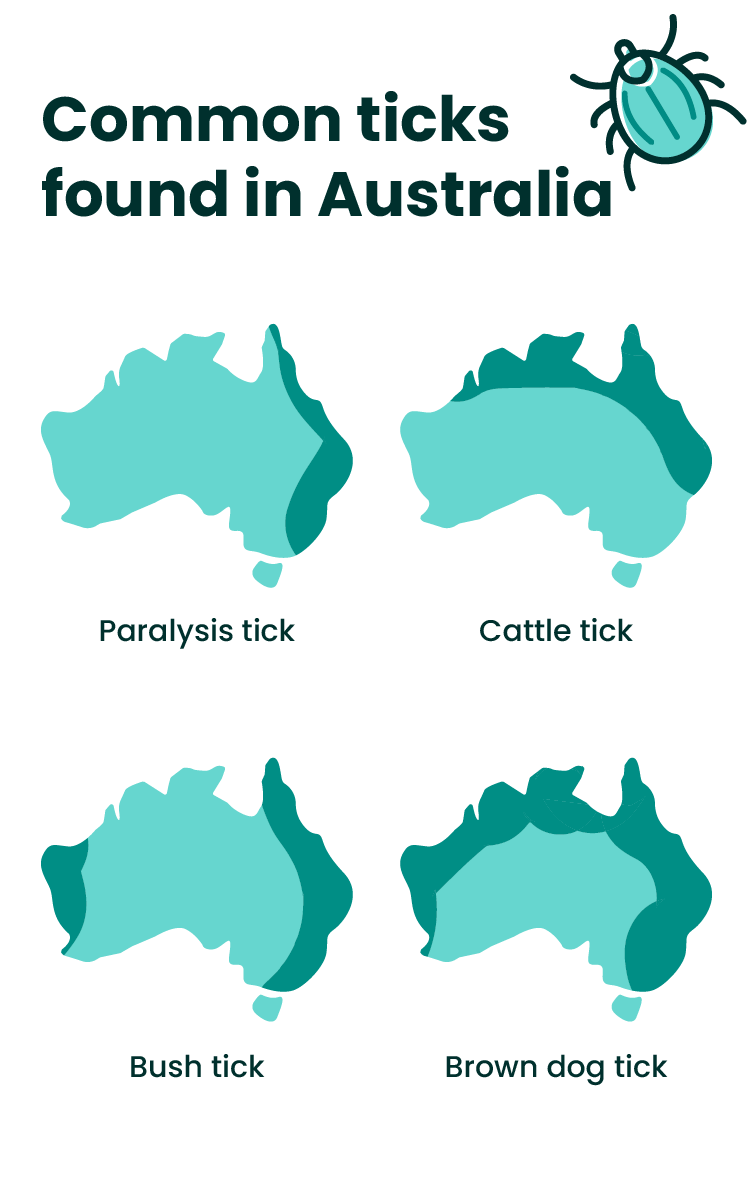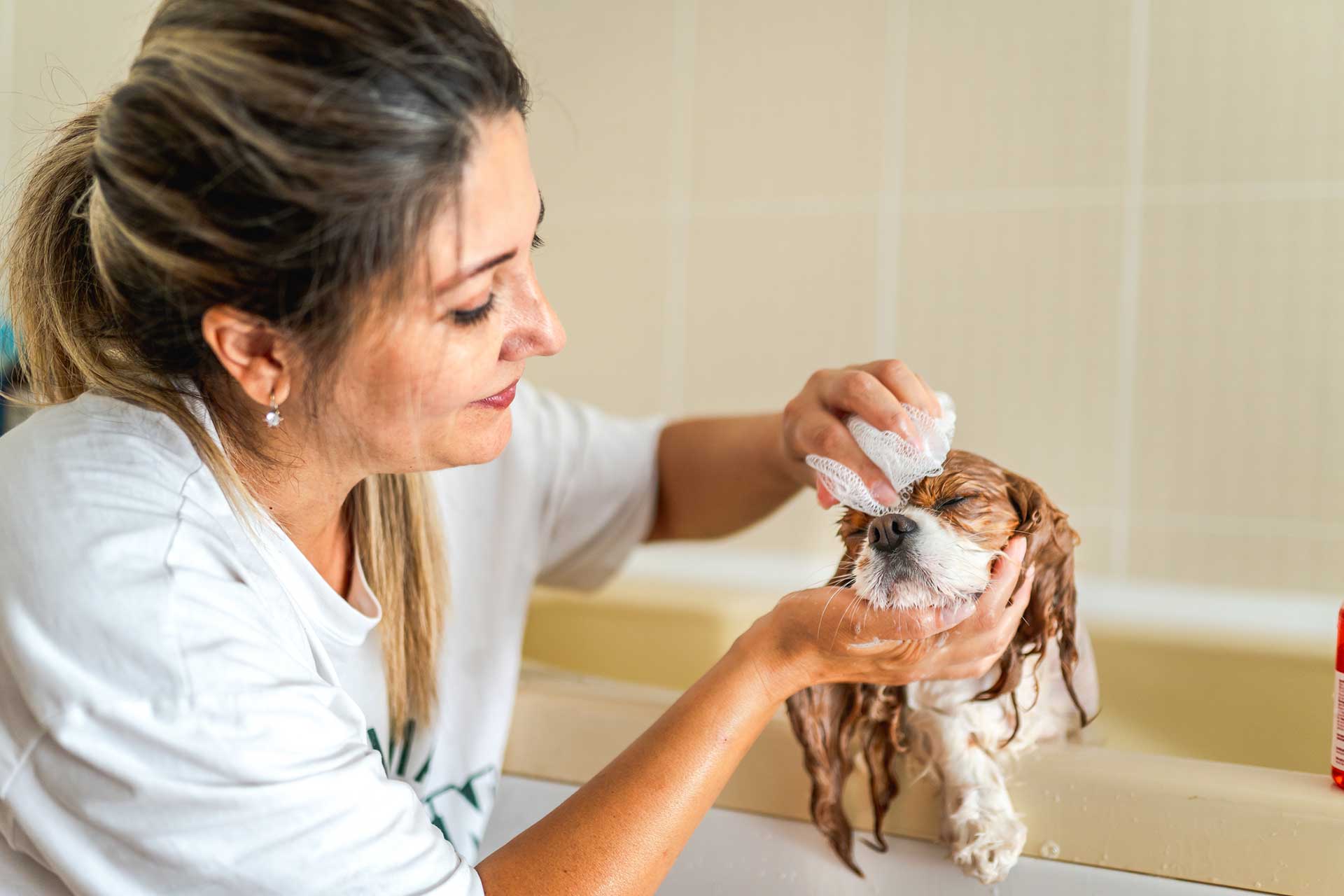Although parasites in dogs and cats are tiny and most often out of sight, these nasty critters can wreak havoc on your pet’s health and, if left untreated, can cause life-threatening illnesses. Learn the signs and symptoms to watch out for and how to protect your cat or dog from these critters.
Most common parasites in Australia
A parasite is a living organism that uses a host – such as your dog, cat or even you – for survival. There are many types of parasites to watch out for in Australia. Here are the most common ones and how to protect your pet from them.
Fleas
Fleas are tiny insects that cause itching, skin irritation and allergic reactions in your pets. If your pet is scratching excessively, biting their fur or you notice they are agitated and restless it’s worth parting their hair (or checking their stomach) to see if there are fleas. But remember, even if you don’t see the flea, they can still be hiding in the fur.
Preventative treatment should be given every month of the year to effectively prevent flea infestations. Ask your vet at your regular check-up for advice on the best method of flea prevention and what to do if your pet has fleas.
Ticks
Australia has several types of ticks, ranging from the less harmful bush tick to the deadly paralysis tick, found along the east coast. In pets, paralysis ticks can cause breathing difficulty, weakness, paralysis of the legs and, in extreme cases, death.
Tick prevention products for dogs and cats include a yearly injection administered by your vet, oral chews, spot-on products (liquid applied directly on the skin), tick collars, sprays and rinses. Talk to your vet about the most suitable tick prevention product for your furry friend.
Unfortunately, no treatment is 100% effective, so it’s crucial to check your pet for ticks during tick season (July to December). Run your fingertips over their skin, checking for lumps. Focus on their head, neck, and ears, but don’t forget to check their entire body.


Mites
There are various tiny parasites that can bother both cats and dogs. Each parasite can cause different problems and will need specific treatments. Some of the common mites to keep an eye out for in your pets include ear mites (which can present as intense rubbing and scratching of the ears), scabies (which causes redness, inflammation and itchiness of the skin) and demodectic mange (which often presents as patchy hair loss).
Mites are highly contagious and can easily pass from pet to human – so it’s important to seek advice and treatment from your vet immediately if you suspect an infestation.
Intestinal worms
Intestinal worms live in the intestines and feed on the nutrients that your pet consumes. The most common intestinal worms in Australia are roundworm, tapeworm and hookworm. Left untreated, they can cause weight loss, vomiting, diarrhoea, anaemia and even death. Pets usually become infected with intestinal worms by ingesting the eggs of the parasites, which can be found in contaminated soil, faeces and other sources.
Regular deworming treatments will proactively protect your pet from intestinal worms.
Aim to deworm your puppy or kitten every 2 weeks until they’re 12 weeks of age and then continue once a month until they’re 6 months of age. Depending on the product, continue every 3−6 months for the rest of their life.
Vet tip: Intestinal worms can be transmitted from pets to humans, so it’s important to wash your hands after touching your pet or picking up their poo.
Heartworm
Heartworm parasites are transmitted through mosquito bites. These worms can grow in your pet’s heart and lungs, causing serious damage to their health, and often death. Heartworm in cats is less common than in dogs.
Heartworm prevention is the best way to ensure your pet stays healthy and free from these parasites. Ongoing protection is recommended in most areas of Australia, although Tasmania is considered low risk. There are various options to protect your pet from heartworm, including monthly chews, spot-on treatments, or a convenient yearly injection for dogs. Ask your vet to recommend a suitable product for your pet.
Giardia
You may have heard of giardia in humans, but did you know your pets can get this nasty gastrointestinal parasite too? Typically transmitted through the ingestion of contaminated drinking water, food or faeces, giardia can cause diarrhea, foul-smelling stool, weight loss, dehydration and abdominal discomfort and bloating.
If your vet suspects your pet has giardia they will perform a stool test and prescribe medication to treat the parasite.
Signs and symptoms of a parasite infection
Some key signs and symptoms to look at for:
- Intense scratching, biting, and licking their skin
- Patchy hair loss or irritated skin
- Visible parasites on their skin, bedding on in their faeces
- Vomiting and diarrhoea
- Bloating, particularly puppies and kittens
- Weight loss
- Anal scooting
- Sudden paralysis or difficulty breathing (pets who show these signs need emergency veterinary treatment straight away).
If you notice any of these signs or suspect your pet may have a parasite infection, visit your vet. With regular check-ups, preventive measures, and good hygiene, you can protect your pet from these pesky parasites.








